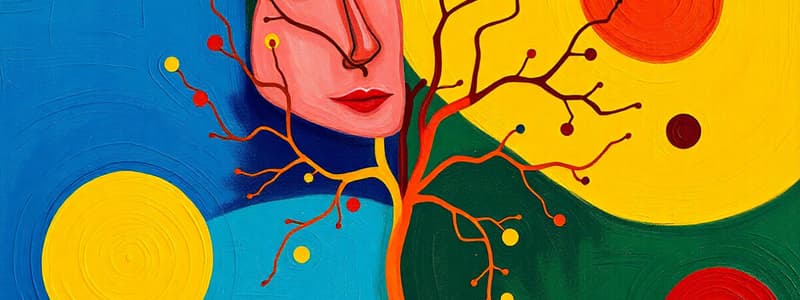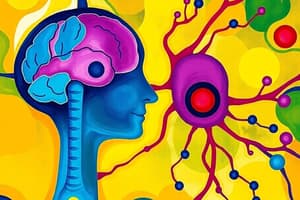Podcast
Questions and Answers
What is one potential cause of hypopituitarism?
What is one potential cause of hypopituitarism?
- Autoimmune disorders
- Increased hormone production
- Pituitary tumors (correct)
- Hyperthyroidism
Which of the following is a common presentation of hypopituitarism?
Which of the following is a common presentation of hypopituitarism?
- Increased libido
- Weight gain
- Heightened energy levels
- Specific hormone dysfunction (correct)
What is a primary method for diagnosing hypopituitarism?
What is a primary method for diagnosing hypopituitarism?
- MRI of the brain
- Urine analysis
- Salivary hormone tests
- Blood hormone level measurements (correct)
Which treatment is typically used for managing hypopituitarism?
Which treatment is typically used for managing hypopituitarism?
What might be a symptom of hypopituitarism?
What might be a symptom of hypopituitarism?
Which of the following is NOT typically associated with hypopituitarism?
Which of the following is NOT typically associated with hypopituitarism?
What is the role of the hypothalamus in relation to the pituitary gland?
What is the role of the hypothalamus in relation to the pituitary gland?
Which natural treatment is considered for hypopituitarism?
Which natural treatment is considered for hypopituitarism?
Hypopituitarism is most likely to cause disturbances in which of the following?
Hypopituitarism is most likely to cause disturbances in which of the following?
What differentiates pituitary adenomas from other types of tumors?
What differentiates pituitary adenomas from other types of tumors?
Which of the following statements about pituitary adenomas is false?
Which of the following statements about pituitary adenomas is false?
What might be the most complex challenge associated with the diagnosis of hypopituitarism?
What might be the most complex challenge associated with the diagnosis of hypopituitarism?
What is a potential outcome if hypopituitarism remains untreated?
What is a potential outcome if hypopituitarism remains untreated?
Which natural treatment approach for hypopituitarism is least likely to involve direct dietary intervention?
Which natural treatment approach for hypopituitarism is least likely to involve direct dietary intervention?
Which sign might suggest severe hypopituitarism in a patient?
Which sign might suggest severe hypopituitarism in a patient?
Which hormone is typically impacted by issues related to the anterior pituitary gland?
Which hormone is typically impacted by issues related to the anterior pituitary gland?
Which condition often results from hormonal imbalances stemming from pituitary dysfunction?
Which condition often results from hormonal imbalances stemming from pituitary dysfunction?
What distinguishes regulatory mechanisms of the hypothalamus from those of the pituitary gland?
What distinguishes regulatory mechanisms of the hypothalamus from those of the pituitary gland?
In which scenario would natural treatment interventions for hypopituitarism be least beneficial?
In which scenario would natural treatment interventions for hypopituitarism be least beneficial?
Flashcards are hidden until you start studying
Study Notes
Hypothalamic & Anterior Pituitary Hormones & Targets
- Hypothalamic hormones are released from the hypothalamus and influence the anterior pituitary gland to release its own hormones.
- Growth hormone-releasing hormone (GHRH) stimulates the release of growth hormone (GH) from the anterior pituitary.
- Thyrotropin-releasing hormone (TRH) stimulates the release of thyroid-stimulating hormone (TSH) from the anterior pituitary.
- Corticotropin-releasing hormone (CRH) stimulates the release of adrenocorticotropic hormone (ACTH) from the anterior pituitary.
- Gonadotropin-releasing hormone (GnRH) stimulates the release of follicle-stimulating hormone (FSH) and luteinizing hormone (LH) from the anterior pituitary.
- Prolactin-releasing hormone (PRH) stimulates the release of prolactin (PRL) from the anterior pituitary.
- Dopamine (DA) inhibits the release of prolactin (PRL) from the anterior pituitary.
Hypothalamic Dysfunction
- The hypothalamus plays a crucial role in regulating the endocrine system, and its dysfunction can lead to various hormonal imbalances.
- Hypothalamic-Pituitary-Adrenal (HPA) Axis dysfunction can result in conditions like Cushing's disease or Addison's disease.
- Hypothalamic-Pituitary-Thyroid (HPT) Axis dysfunction can lead to hypothyroidism or hyperthyroidism.
- Hypothalamic-Pituitary-Gonadal (HPG) Axis dysfunction can cause problems with fertility, sexual development, and menstrual cycles.
Anterior Pituitary Disorders
- Pituitary Tumors (Adenomas): These are benign tumors that can cause hormonal imbalances depending on the specific cells affected.
- Hypopituitarism: This is a condition where the pituitary gland does not produce enough hormones.
Pituitary Tumors (Adenomas)
- Pituitary adenomas are benign tumors that can impact the pituitary gland's hormone production, leading to hormonal imbalances.
- Most pituitary adenomas are microadenomas (less than 1 cm in diameter), while some can be macroadenomas (larger than 1 cm).
- Prolactinomas are the most common type of pituitary adenomas, affecting the production of prolactin.
- Growth hormone adenomas lead to excess growth hormone production, causing acromegaly in adults and gigantism in children.
- ACTH-producing adenomas result in Cushing's disease, leading to excess cortisol production.
Hypopituitarism
- Hypopituitarism is a condition where the pituitary gland does not produce sufficient amounts of one or multiple hormones.
- Etiology:
- Pituitary tumors can cause hypopituitarism by compressing or destroying the pituitary gland.
- Postpartum pituitary necrosis (Sheehan syndrome) is a rare condition where the pituitary gland is damaged during childbirth due to blood loss.
- Infections (meningitis, tuberculosis) can damage the pituitary gland.
- Head trauma can also injure the pituitary gland.
- Surgical removal of the pituitary gland is occasionally necessary to treat pituitary tumors or other pituitary conditions.
- Radiation therapy can also affect the pituitary gland.
- Infiltration (sarcoidosis, hemochromatosis) can damage the pituitary gland.
- Presentation: Hypopituitarism can present with a wide range of symptoms depending on which hormones are deficient.
- Signs and Symptoms:
- GH deficiency: Short stature in children, decreased muscle mass and bone density in adults.
- TSH deficiency: Fatigue, weight gain, cold intolerance, and hair loss.
- ACTH deficiency: Fatigue, weakness, weight loss, low blood pressure, and low blood sugar.
- FSH and LH deficiency in women (Amenorrhea), in men (decreased libido, erectile dysfunction, and infertility)
- Prolactin deficiency: Difficulty with breastfeeding.
- Diagnosis:
- Blood tests to measure hormone levels.
- MRI scan to assess the pituitary gland's size and structure.
- Treatment:
- Hormone replacement therapy is the primary treatment for hypopituitarism.
- Surgery may be required to remove pituitary tumors or other issues affecting the gland.
- Radiation therapy may be used in certain cases to shrink tumors or prevent their regrowth.
Hypothalamic and Anterior Pituitary Hormones & Targets
- The hypothalamus produces releasing and inhibiting hormones that control the anterior pituitary gland's secretion of hormones
- Gonadotropin-releasing hormone (GnRH) stimulates follicle-stimulating hormone (FSH) and luteinizing hormone (LH) release from the anterior pituitary gland
- Thyrotropin-releasing hormone (TRH) stimulates thyroid-stimulating hormone (TSH) release
Hypothalamic Dysfunction
- Can occur due to various factors, including tumors, infections, and autoimmune disorders
- Hypothalamic dysfunction can lead to hormonal imbalances, affecting various bodily functions
- Symptoms:
- Decreased production of growth hormone: leading to stunted growth in children
- Disruption of the menstrual cycle in females
- Infertility
- Metabolic changes
- Changes in body temperature regulation
- Alterations in sleep patterns
Hypothalamic Hormone Targets
- GnRH targets the anterior pituitary gland, stimulating FSH and LH release, which regulate ovary and testes function
- TRH targets the anterior pituitary gland, stimulating TSH release, which regulates thyroid function
- Corticotropin-releasing hormone (CRH) targets the anterior pituitary gland, stimulating adrenocorticotropic hormone (ACTH) release, which regulates adrenal gland function
- Growth hormone-releasing hormone (GHRH) targets the anterior pituitary gland, stimulating growth hormone (GH) release, which promotes growth and development
Anterior Pituitary Disorders
- Pituitary tumors (adenomas)
- Hypopituitarism
Pituitary Tumors (Adenomas)
- Can be benign or malignant
- Benign tumors are the most common and can cause hormonal imbalances due to excessive hormone production
- Symptoms
- Acromegaly: excessive growth hormone production, leading to enlarged hands, feet, and facial features
- Cushing’s disease: excessive cortisol production, leading to weight gain, muscle weakness, and high blood pressure
- Prolactinoma: excessive prolactin production, leading to menstrual irregularities, infertility, and breast milk production without pregnancy
Hypopituitarism
- Occurs when the anterior pituitary gland does not produce enough hormones
- Causes: Pituitary tumors, infections, autoimmune disorders, and head trauma
- Symptoms: Fatigue, weight loss, decreased libido, menstrual irregularities, infertility, and cold intolerance
- Diagnosis:
- Hormone levels (blood tests)
- Imaging tests: MRI or CT scan to visualize the pituitary gland
- Treatment: Hormone replacement therapy
- Natural Treatment:
- Supportive: Adequate sleep, stress reduction, exercise, and healthy diet
- Standard Process Products: A supplement line for nutrient deficiencies
- Low Force Interventions:
- Acupuncture
- Herbal remedies
- Mind-body techniques (yoga, meditation)
Hypopituitarism Treatment
- Hormone replacement therapy
- Supportive care:
- Lifestyle changes: Diet, exercise, and stress management
- Monitoring: Regular checkups with a doctor to monitor hormone levels and overall health
- Specific hormone replacement therapies:
- Growth hormone: If deficiency is present
- Thyroid hormone: If deficient in thyroid hormone
- Cortisol: If adrenal insufficiency is present
- Sex hormones: If deficient in sex hormones
- Prolactin: If deficient in prolactin
- Surgery: In cases of pituitary tumors
Studying That Suits You
Use AI to generate personalized quizzes and flashcards to suit your learning preferences.




